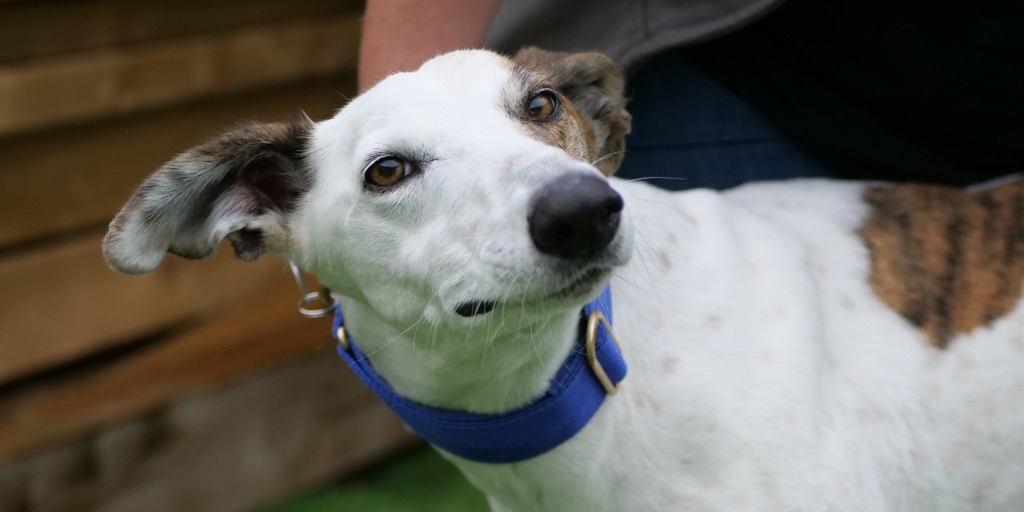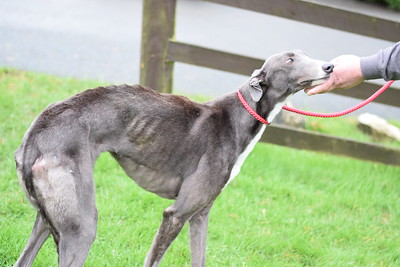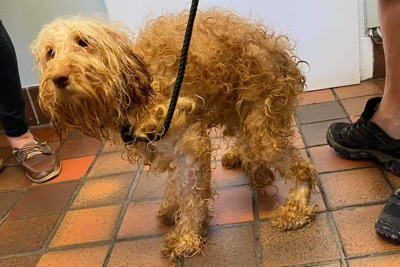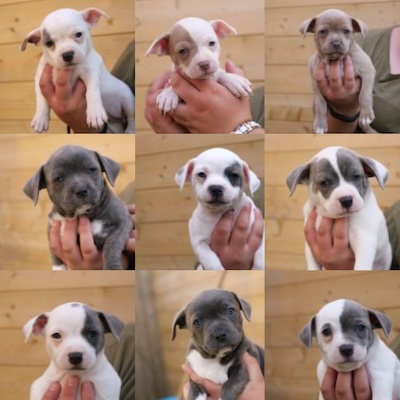

About Us
We are a small, passionate, dog rescue based in North Wales, UK.
We aim to provide a safe haven for dogs that have been abandoned through no fault of their own, rehome them, and to educate the next generation of dog owners.
Our Vision
Our vision is for all dogs to “live the good life”, free from cruelty, abuse, neglect or fear and having their physical, social and emotional needs met.
Our Mission
- 1. To provide a safe haven for, and to successfully re-home, dogs that are abandoned through no fault of their own.
- 2. To promote responsible ownership and provide support to both fosterers and adopters from two fully qualified dog behaviour specialists and experienced volunteers.
- 3. Through developing our education programme, we aim to reach young people and to help them to:
- - be safe around and respect dogs
- - understand different breeds to make an informed decision when choosing a dog
- - be aware of animal cruelty and exploitation (including online sales and working dogs)
- 4. To offer our support to the appropriate bodies in order to put a stop to the unnecessary and needless suffering of dogs but in particular:
- - racing greyhounds
- - breeding dogs and their puppies
- - dogs sold online
Our Values
- We are passionate about the welfare and happiness of all dogs. Whilst not being breed specific, approximately a quarter of our rescues have been greyhounds.
- Dogs in the local pound and urgent social cases (eg. deceased owners) will be prioritised for rescue.
- Whilst in our care, we strive to ensure each and every dog receives the most appropriate care - on site in kennels or on short or long-term placement with suitable fosterer, where all practical needs are met by the rescue.
- Our re-homing principles prioritise the dog’s needs and so placement is based on finding the best match adopter/home/family for each individual dog. This is done through careful assessment of the animal, scrutiny of applicants and home checks.
- We understand that issues may well arise as the dog settles into its new home and the adopters begin to adapt to life with a new pet, so we offer a lifetime guarantee of support from our dog behaviour specialists and experienced volunteers.
- We would like to see an end to backstreet breeding, puppy farming, online dog sales and greyhound racing through education and exposure and will lend our support to the appropriate bodies to this end.
- We recognise, appreciate and value the time, effort and support given freely and willingly by our many volunteers in a variety of ways.
Our Political Principles
Our vision is for all dogs to “live the good life”, free from cruelty, abuse, neglect or fear and having their physical, social and emotional needs met. We aim to provide a safe haven for dogs that have been abandoned through no fault of their own and to rehome them. We promote responsible ownership and provide support to all the adopters and fosterers of our dogs.
Dogs are sentient animals. This means they can experience both positive and negative emotions, such as pleasure, comfort, fear, and anxiety. New data from neurobiological and genetic studies show growing evidence that many animals can suffer mental distress similar to that seen in humans - the striking similarities in the way canine and human brains process emotional information has been likened to that of a 2½ year old child. A child will recognise you and run to you, smiling, with arms outstretched; a dog will recognise you and run to you with a waggly tail. A child will scream with pain; so will a dog. A child will cower in fear; so will a dog. Anxiety and stress will cause a child to wet the bed; the same with a dog - they are part of the family and we believe they should be afforded the same level of tender loving care, attention and understanding.
Our mission is to halt the present surge in neglect, cruelty and overbreeding and to promote responsible ownership. These are the principles on which we base our politics and for which we will endlessly campaign. Rescue Centres exist for precisely that - to rescue dogs which have got themselves genuinely lost or which find themselves homeless due to their owner falling seriously ill or being taken into care, for example, - not for the needless and wanton disregard, abandonment, callous and heartless actions of their keepers.
So, our political stance is to educate and campaign. We want to see an end to backstreet breeding, puppy farming, online dog sales and greyhound racing. Through education and exposure, we want to put a stop to the unnecessary and needless suffering of these dogs. To this end, we both lobby as well as co-operate with Politicians across the UK and support the work of the Welsh Cross-Party Group for Animal Welfare. We have a representative on the Welsh Government’s ‘Responsible dog breeding and ownership practitioner group’ which is a working group for the Animal Welfare Branch of the Department for Climate Change and Rural Affairs. We strongly disagree with the categorisation made by the UK Government in its recent legislation regarding ownership, regulation and breeding of “XL bully type” dogs and believe that any judgements should be based on behaviour and temperament - i.e. on ‘deed’ and not ‘breed’.
A number of MSs, MPs and Councillors from different parties, have been to visit us here at the Rescue Centre, where we have taken the opportunity to highlight these issues whilst remaining independent of party political bias. We are members of the Animal Welfare Network Wales and the North Wales Consortium for Animal Welfare and we work closely with other UK wide rescues and organisations.
Most vets and animal psychologists today agree that dogs can suffer mental disorders and, where human / dog sociability is poor, distress in the form of fear, sensitivity, anxiety or aggression can cause resource guarding, possessive aggression, or anxiety. When triggered by a particularly traumatic event, such an anxiety disorder can develop into the equivalent of PTSD in humans.
One cohort of dogs, many of which we see here at our Rescue and which are particularly susceptible and vulnerable to such stress, are racing greyhounds, whose speed and gentle nature have been exploited. They have often missed out on a ‘normal’ puppyhood, eg: socialisation, company and play. As sensitive and sentient animals, they are highly likely to have been extremely stressed, anxious and afraid. It has been shown that many greyhounds used in the racing industry suffer both physical and psychological damage and so we are politically active in our aim to secure a change in the law to ban greyhound racing in Wales. We have held two rallies in Wrexham and presented evidence to the Senedd to highlight the cruelty of the greyhound racing industry.
Sadly, most of the dogs coming into our rescue have clearly been deprived of the long accepted animal welfare standards known as the 5 Freedoms - from hunger and thirst, from discomfort, from pain, injury or disease, from fear and distress and the freedom to express normal behaviour. Through our developing education programme, we aim to reach young people and educate the next generation of dog owners. We try to help them to be safe around and respect dogs, to understand different breeds in order to make informed decisions in the future and to be aware of animal cruelty and exploitation (including online sales and working dogs).
We raise awareness by going into schools, colleges, libraries, group meetings and workplaces to talk about dog behaviours, abuse and mistreatment and we campaign to influence and change attitudes. We have an ‘Education Board’ in our Charity Shop and stalls at local fairs and shows in order to educate and inform the general public and promote responsible dog ownership.
In recent years, animal welfare thinking has moved on from the concept of simply meeting the basic needs of animals, to recognising their emotional needs and encouraging positive experiences. Known as the Five Domains, they acknowledge the need to go beyond simply resolving negative states to ensuring animals can express their natural behaviour in an enriching environment, feel safe, have healthy positive experiences and a good quality of life. We fully endorse, and strive to spread, this philosophy.
All that we do is funded solely by donations, fundraising and grants. If you agree with our vision, mission and values, please support us - financially or otherwise. Everything we do is for the dogs - rescue and rehome; lobby and campaign; inform, educate and influence. To any philanthropists reading this, let us be your conduit - it will hugely help us, it will make you feel good, but more importantly - you will know that you are “doing it for the dogs”. Thank you for taking the time to read this and for your support.
Our Donating Principles
We recognise that much is to be done to restore giving to the standard we enjoyed pre-Brexit, pre-pandemic, pre-cost of living surge and despite the wars in the Middle East and the effects of climate change.
In a survey conducted recently for the Charity Commission of England and Wales (CCEW), participants prioritised financial information and evidence of impact as most valuable to the public when making decisions about supporting charities. They wanted this information to be easily and quickly accessible in an engaging, visual and simple format that would allow them to learn about and to ‘know’ the charity and develop a closer understanding of how the organisation is going about making a difference to the cause that they care about - a key driver of trust in charities. Participants want to support causes rather than charities per se. and see Charities as organisations, as conduits translating their support to help them achieve this.
“Giving is good for those who give, for those who benefit and for society as a whole” (Orlando Fraser - Chair, CCEW)
At Almost Home, our fundamental aim, our ‘raison d’être’ is to provide a safe haven for dogs that have been abandoned through no fault of their own, care for them and rehome them.
90% of our income is from donations (including donations for adoptions), collections, fundraising, grants and gift aid - and 80% of our expenditure is on caring for our dogs.
The rescue centre is run primarily by volunteers with five self-employed people, 2 paid per day and 3 paid by the hour, as and when. Zero remuneration costs, benefits or expenses have been claimed by the Trustees or volunteers in the past two years.
But we recognise that to be successful, we need to engage the public - and we feel that, whilst the dogs are our number 1 priority, we provide a vital service for the community, in many ways:
- Encourage families to keep their pets, rather than surrendering them to a rescue, by offering advice from our specialists on ways they might help to improve their dog’s behaviour.
- Take dogs in where there is no other choice for the family or all else has failed.
- Help social services by taking in dogs in emergencies, where the owner has died or gone into care. Some of these may become one of our ‘Forever Foster Dogs’.
- Take dogs from the local pounds which are at risk of being PTS.
- Offer advice on national issues, such as the recent regulation around bully type dogs and for which we offered a free or subsidised neutering programme.
- Help families to uphold present regulations by advising and, on occasion financially supporting, the likes of chipping and neutering.
- Inform, educate and influence young people and adults alike on dog breeds, dog behaviour, safety around dogs and generally promote responsible ownership. We do this by visiting schools, colleges, libraries, group meetings and work places.
- Provide opportunities to volunteers, through training and induction, to experience kennel management, dog walking and animal welfare.
- Provide families with suitable and appropriate pets and we offer a lifetime of follow-up support from fully qualified dog behaviour specialists and experienced volunteers.
- Provide seasonal fairs and dog shows for the general public (and their dogs) to enjoy.
However, the demand for help continues to rise to unprecedented levels with no sign of it slowing - a huge increase in dogs coming in with previously untreated and often long-standing medical issues; increasing numbers of abuse and neglect cases; growing numbers of struggling families within the community.
All this has driven our Vet bills up markedly, with it now averaging more than £6500 a month. Our biggest month recently was over £9500. By far, the largest expenditure is on vets' bills - all dogs going through the rescue are flead, wormed, chipped, neutered and vaccinated as well as being treated for any medical needs. Sometimes dogs come into our care that we think maybe difficult to rehome, often because they are in their twilight years or they have an existing medical condition. In these cases Almost Home offer to cover medical expenses in exchange for a loving home for them to spend their, hopefully many, remaining years - these are our very special Forever Foster Dogs.
Our second largest outlay is for the dogs, directly - food, collars, leads, bedding, toys etc. and travel - to transport the dogs, take them (usually more than once) to the vets, take them for home trials, make home visits and checks, collect food and supplies.
We, like everyone else, have felt the burden of ever increasing rental & utility charges along with rising building & kennel maintenance costs - and whilst we have an excellently run Charity Shop which was extremely successful at raising much needed funds, sadly it, too, is struggling to make a profit, in today’s climate. So, as we are acutely aware that many families are also struggling and to uphold our policy of inclusion, we endeavour to keep our suggested adoption donation as low as possible.
Charities are often seen by donors as the channel of their generosity, not the recipient. If your interest and empathy lay with animal welfare, in particular, dogs - and to any philanthropists reading this - let us be your conduit - it will hugely help us, it will make you feel good, but more importantly - you will know that you are “doing it for the dogs”.
What your money buys:
- £150 pays for the neutering of a dog coming into our care.
We make sure our dogs will not be used for breeding and are more likely to become calm pets.
- £300-350 pays for food, vet basics, collar, lead & muzzle.
As well as neutering, we make sure each dog is wormed, deflead, chipped, vaccinated, fed, loved and exercised.
- £500 pays for dry dog food for our dogs for three months.
Most also have some wet food and some need specialist food.
- £1,500 pays for one weeks’ veterinary costs.
These are just the basic costs of worming, fleaing, chipping, vaccinating.
- £1,500 pays for a year’s worth of specialist items.
Leads, head collars, muzzles, training leads, etc.
- £2,000 pays for BOAS surgery.
This aims to improve air flow through a fundamentally compromised upper airway, commonly found in short-muzzle and flattened face dogs - e.g. Sniffles, a 6 year old Frenchie who had been used for breeding.
- £3,000 pays for orthopaedic surgery.
One example being 4 month old Tilly, who needed surgery to repair a deformed and previously fractured back leg and reattach her growth plate. Tilly’s injuries weren’t accidental!
- £10,750 pays for a month of warm, dry kennels; food; routine vet treatment; transport; collar, lead etc.
Whilst with us, each rescued dog needs to feel safe and comfortable; free from pain or anxiety; to decompress; to rebuild trust. This gives us the best chance of finding them a new, loving home.
Some dogs arrive in quite a state..


We have even had whole litters of puppies..

Thank you for taking the time to read this and for your support - financially, or otherwise.